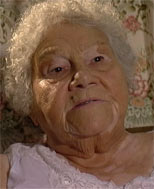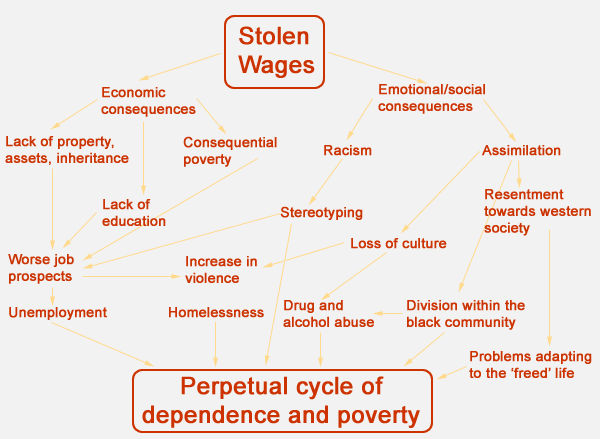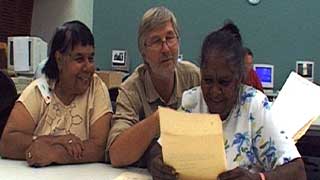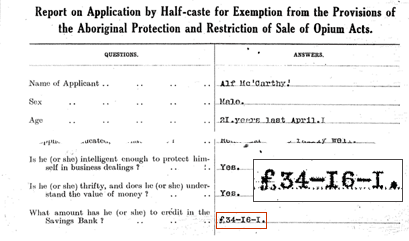Stolen wages
Stolen Wages
From the late 1800s until the 1970s Aboriginal workers were for all intents and purposes enslaved. They were denied access to their wages which in many cases were simply stolen by corrupt officials and employers. It locked them into a cycle of poverty. Governments and churches have made it difficult to access records and there is a general reluctance to pay the monies withheld.

Wishing you knew more about Aboriginal culture? Search no more.
Get key foundational knowledge about Aboriginal culture in a fun and engaging way.
This is no ordinary resource: It includes a fictional story, quizzes, crosswords and even a treasure hunt.
Stop feeling bad about not knowing. Make it fun to know better.
Selected statistics
In Queensland, Jubilee Jackson worked as a stockman near Mt Garnet for 60 years from the age of ten. His pay was a small amount of pocket money at rodeo time. The rest was held in a trust account. When he died in 1967 there was only $99 in his government controlled account.
— 'Hard Labour, Stolen Wages' [3]
Why were wages "stolen"?
Many Aboriginal people who worked for white people did not receive their wages directly. Their bosses only gave them 'pocket money' while from 1897 to the late 1970s their wages were 'administered' for them by government or police authorities [4]. In Western Australia wages were under "total government control" until 1968 [5].
The contribution Aboriginal people made to Australia's economy with their largely unfairly paid or unpaid work is a history seldom told.
"Aboriginal people are often denigrated as being a drain on the nation's economy, but if you look at the facts it's actually the other way around, with Aboriginal labour being used to build the economy without due payment or even recognition," says Dennis Eggington, Chief Executive of the Aboriginal Legal Service of Western Australia [5]. "It's a terrible injustice that has been perpetrated over many decades, with the truth hidden from the official version of Australian history."
There is no doubt in my mind that this country's strong economy was born on the backs of Aboriginal labour.
— Rachael Sievert, WA Green Senator [6]
When I was in school, I was told that Australia developed on the sheep's back. I now know that it developed on the backs of thousands of Aboriginal men, women and children.
— Gary Highland, National Director, Australians for Native Title and Reconciliation (ANTaR) [7]
Between 1916 and 1960 money of Aboriginal workers from Victoria was withheld as punishment, with wages and contracts being controlled by the Aboriginal Protection Board [8]. Not every worker was affected though.
Today we talk about 'stolen wages' because in many cases Aboriginal people did not receive parts or all of these wages. Historians estimate that the state of Queensland alone owes around $500 million to Aboriginal people [4]. Some individuals are owed close to half a million dollars in today's terms [9].
According to the dictionary, if someone "works under duress and without payment" they are considered slaves. The stolen wages are always about the slavery Australia denies until today.
Documents exist showing that governments knew exactly what they were doing, and that they were breaking the law[6][7]. Investigations reveal that Aboriginal wages were misappropriated by governments to cover their own liabilities, including the cost of removing Aboriginal children. This means Aboriginal people were unwittingly paying for the removal of their own children. [10]
Lawyers know that stolen wages claimants' demands rest on legal right and not on the uncertain and contestable ground of moral right [9], however governments show excellence in delaying and rejecting claims. Time works against Aboriginal people as they grow older and die without receiving compensation.
Until 1972, laws in WA allowed employers to hold 75% of the wages of Aboriginal people in a complex network of trust accounts that were administered by government departments [11].
Which monies were stolen?
Governments not only withheld wages but also
- child endowments and benefits,
- savings,
- inheritances,
- soldiers’ pay,
- maternity payments,
- trust funds,
- deceased estates,
- unemployment benefits,
- lump sum compensation payments
- aged or invalid pensions, and
- workers compensation.
Story: Australia's Aboriginal slaves
Research by Dr Rosalind Kidd shows that the government-inflicted treatment of Aboriginal people resulted in "starvation, under-payment or no payment of wages, sexual abuse of workers, conditions tantamount to slavery, and abduction." [12]
A submission to the Stolen Wages committee reads:
"A woman reported to me that as a young woman she slept in a shed. Her day began before dawn when she commenced to prepare the employer's family's breakfast, then attended to the invalid grand mother, had breakfast on enamel utensils specially set apart for her, cleaned up the kitchen, did some house work then did ploughing or fencing with the farmer, returned at dusk to make the meals, cleaned up and put the grand mother and then herself to bed.
"This woman had no other company, was not taken on or given outings and had no means to travel, had no holidays, was paid no money and chose no item of clothing for herself until after she ran away when she was about 30 years old." [13]
And another submission:
"At the age of 10, transferred to the Salvation Army Home for Boys at Indoroopilly, that was a lesson I will never forget, I scrubbed floors, helped in the kitchen, worked from daylight till dawn, washing clothes in the laundry, which was slave labour." [14]
Another person submitted this testimony:
"I used to start work on Tuesdays from 6 o'clock and work through to 11 o'clock at night because I'd be looking after 6 children - the youngest would have been eight months. I was not even 14 at the time... it was like slave labour." [15]
Contracts issued by governments made leaving a punishable offence. If people did leave, in most states police hunted them and returned them in chains [7].
Children and elderly had to work for rations so scarce that malnutrition was "rampant" [7].
"It was claimed at the time that cash wages perverted the work ethic. There is a word for this—slavery," concludes author Dr Rosalind Kidd. [7]
Stolen wages, stolen future
Many Aboriginal people whose wages were stolen were also stolen children, denying them cultural and economic futures.
"As a result of my growing up 'under the [Aboriginals Preservation and Protection] Act', I received a limited education. As such, I had limited job opportunities. When my husband died, it was financially difficult to raise my three small children on my limited income and widows' pension. It would have eased the financial burden if I was able to access the balance of my savings account and the interest accumulated over the years." [16]
We could have had our own homes from the wage we are owed, and had the ability to set things up for our children. It breaks your heart to see our children still struggling.
— Marjorie Woodrow, Aboriginal stolen wages claimant [17]
Since the national Inquiry into Stolen Wages in 2006 there has been no policy implemented on a federal or state level to address the injustices of stolen wages owed to Aboriginal people. [18]
Consequences of the stolen wages

With previous generations unable to generate wealth and livelihood as they were denied their wages, this is seen as a key contributor to the intergenerational poverty which still plagues many communities. Without access to the economic base other Australians take for granted Aboriginal people struggle to shake off the welfare-dependent stereotype.
The majority of Australians have yet to acknowledge the "evident link between settlement life, stolen wages and the lack of education and employment in today's society". [19] How are Aboriginal people to become successful workers and businessmen when they are locked into a cycle of poverty?
"One thing Aboriginal people haven't been able to do is build wealth. Wealth in terms of picking the suburb you live in, what sort of roof you put over your head, the types of schools that you send your children to, the type of health cover that you can provide for your family," explains Adam Goodes, an AFL star and former Australian of the Year.
"All of those things are the things that affect a lot of disadvantaged Aboriginal communities. They're really affecting the life expectancy of our people. By generating wealth, you [can] flip that completely." [20]
Aboriginal people have still not received the recognition they deserve for their contribution to Australia's economic prosperity. Without Aboriginal people Australia would not be where it is today, specifically in industries like farming or pearling.
"It was like working on a prison farm"

Melrose Donley remembers: "The day started at 3.30am to round up cows in the dark, barefooted, chilblains on my feet, falling over logs and when a cow from lying on the ground, upon rising, would do her dropping, it being warm I would rub it up my legs and the warmth from it would ease the pain." [14].
Colin Graham

Colin Graham was born in 1947. He started work at the age of nine. Read about his difficult life, hard work, lack of education, racism and how South Africa's Apartheid system modelled Queensland's Aboriginal Protection Act [21].
Read many more moving submissions to the Inquiry into Stolen Wages on the Parliament of Australia website.

Finding records on stolen wages
Every state had an Aboriginal Protection Board where bureaucrats and policemen meticulously recorded what was going on in their reserves and missions. Today these documents are kept with the State Records authorities. When you lodge a stolen wages claim, staff of the State Records authorities search their archives for documents supporting it.

Records might be incomplete because of poor bookkeeping or because they were deliberately destroyed to cover fraudulent use of Aboriginal money [22], especially when the Aboriginal Welfare Board was disbanded in the late 1960s [23][24].
"We know that many of these files were destroyed or burned or have gone missing," explains Dennis Eggington, CEO of the Aboriginal Legal Service of Western Australia [2]. "Getting the right material and the right information back out of the system is by far going to be the trickiest part."
"I remember a case when I was a senior welfare officer at Moree in the 1970s," says Les Ridgeway, an Aboriginal elder from NSW [25]. "An instruction came down from the head office of the child welfare department instructing all the district offices around NSW to go out on the mission stations or reserves, collect those old files out of the former managers' offices, take them to the town dump and burn them." Today these files would be of immense value to Aboriginal people.
Furthermore most records are not digitised. All of this makes it extremely difficult for claimants of stolen wages to prove their case and is the main reason for low levels of successful applicants.
A documentary by Australian Broadcasting Corporation's television channel (ABC) [23] found that Aboriginal people were paid or issued cheques, but these cheques simply never got to the people for whom they were intended. Many were forgotten in the safes of a local police station because the police couldn't be bothered to go out to find these people. Some of the cheques were also pocketed.
When hunting for documents many stolen wages claimants are left to their own devices as departments and governments refuse access to documents.
- The Queensland government is said to have "refused to supply documents within its possession which would assist in identifying claims" and the Commonwealth Bank, which held "many of the monies" has probably never been asked to produce its records [24].
- The Department of Indigenous Affairs "censored" files when it removed name references prior to reluctantly handing the documents to Aboriginal people [5].
- The West Australian Government has not opened up its archive for descendants of stolen wages victims [26].
Stolen wages claimants who worked under the control of church institutions have similar problems because the churches have been reluctant to make their records available [27]. Organisations need to use Freedom of Information processes to retrieve relevant documents.
Some people want the process reversed, that is the government should prove that it does not owe money to the claimant.
I didn't even know anything about money. I didn't know how to spend money. [...] I was there to obey.
— Valerie Linow, trained to be a domestic servant [23]

Stolen Wages support groups
Stolen Wages Working Groups
Stolen Wages Working Groups (SWWGs) exist in major cities and meet about once a month. They consist of elders, claimants, family and other Aboriginal community representatives of the former workers affected by stolen wages, trade union representatives, ANTAR and other concerned community groups and individuals.
The Stolen Wages Working Groups' campaign has the following goals:
- Current compensation offers should be considered a down payment.
- The offer should be extended to families of deceased workers.
- Closure for the stolen wages issue must be renegotiated directly with Aboriginal communities.
- Establish the rights of claimants of stolen wages to determine what should happen with the leftover funds.
It has taken SWWGs nearly six years to find a minister who was prepared to sit down and talk with them [29].
Wampan Wages
The Wampan Wages ('Pay back wages') Victorian Stolen Wages Working Group is an informal working group made up of Indigenous and non-Indigenous people who have an interest in stolen wages and Aboriginal justice.
The group facilitates research into stolen wages and other entitlements owed to Victorian Aboriginal people.
Resources
.gif)
Read Rosalind Kidd's Hard Labour, Stolen Wages report which gives a state by state account of the history of stolen wages.
Browse the submissions to the senate inquiry into stolen wages which give you an authentic picture about working conditions, types of jobs and how Aboriginal people felt at that time (check the quotes on this page).
Stolen wages in the U.S.
Stolen wages is not an issue unique to Australia. Since the late 19th century the U.S. government has been in charge of a trust fund known as the 'Individual Indian Monies Trust' [30]. It was established when the U.S. Congress parcelled out land owned by a number of American Aboriginal tribes.
Excess lands allotted to people from those tribes were put in trust and managed by the Bureau of Indian Affairs (BIA), an agency of the Department of the Interior. Trust beneficiaries derive income from royalties on their land, which the BIA leases out for activities such as logging, oil and gas exploration, and grazing.
But for more than 100 years these trust fund monies have been grossly mismanaged. To this day the U.S. Treasury Department issues cheques on an account, worth billions of dollars, which cannot be balanced or reconciled.
The U.S. Department of the Interior has been found guilty of breaching trust obligations to at least 300,000 First Nations Americans.